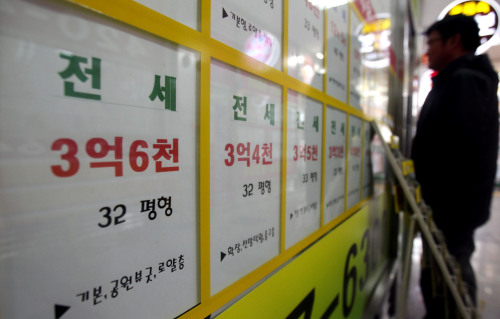A package of government measures unveiled Thursday to curb rising consumer prices includes a policy to stabilize the property market amid soaring housing rent prices.
The government has focused on active supply of small-sized houses and funding for the mid- and lower-income households which generally resort to “jeonse,” the Korean rent system under which tenants pay a lump-sum deposit to rent a house for a certain term, for their housing.
The Ministry of Land, Transport and Maritime Affairs is considering supplying about 127,000 small-sized housing units this year.
In coordination with state-run financial companies, the government plans to increase the amount of loans for the jeonse applicants. The total jeonse loans are expected to reach 6.8 trillion won ($6 billion).
In addition, the policy of easing regulations on the housing market will also be conducted.
The government has focused on active supply of small-sized houses and funding for the mid- and lower-income households which generally resort to “jeonse,” the Korean rent system under which tenants pay a lump-sum deposit to rent a house for a certain term, for their housing.
The Ministry of Land, Transport and Maritime Affairs is considering supplying about 127,000 small-sized housing units this year.
In coordination with state-run financial companies, the government plans to increase the amount of loans for the jeonse applicants. The total jeonse loans are expected to reach 6.8 trillion won ($6 billion).
In addition, the policy of easing regulations on the housing market will also be conducted.

The jeonse prices continued to sharply rise over the past year, aggravating the financial burden on the mid- and low-income brackets.
Lump-sum rent rose 7.1 percent last year, the highest rate per annum since 2003, in contrast to a stagnant property market.
After jumping 10.1 percent in 2002, jeonse prices have remained quite stable until recently. They rose 2.6 percent in 2007, 1.7 percent in 2008 and 3.4 percent in 2009.
Jeonse for apartments rose sharply at 8.8 percent in 2010, up from 4.5 percent in 2009 and 0.8 percent in 2008.
Mid- and small-sized apartments were the most popular with their jeonse rising 7.3 percent and 8.1 percent, respectively, compared to a 5.4 percent rise for large-sized apartments.
While the government expects jeonse prices to be tamed in several months, remains skeptical the market.
Land minister Chung Jong-hwan told a news briefing that “the government has unveiled all possible countermeasures.”
A director of Real Estate Serve said: “It is true that the number of housing units is important. But the more important point is where the new houses will be constructed.”
As indicated in his remarks, jeonse prices have skyrocketed in regions including Gangnam, which offers a favorable educational environment for students.
An employee of Speedbank spoke of the necessity to reduce the demand rather than increasing supply for effective control of the jeonse market.
Last month, the government announced a plan including measures to rescue the real estate market through support for private construction companies and loosening of regulations.
In its report to President Lee Myung-bak, the Ministry of Land, Transport and Maritime Affairs said it would abolish the parcel price ceiling system for private housing sites in all regions except Seoul to promote private residential construction.
This move eliminates in one stroke all of the real estate regulations introduced during the Roh Moo-hyun administration.
The ministry also announced plans to expand the targets for the purchasing of unsold private residential units on condition of resale.
Observers are predicting controversy, as all of these measures provide support solely to private construction companies.
By Kim Yon-se (kys@heraldcorp.com)



![[AtoZ into Korean mind] Humor in Korea: Navigating the line between what's funny and not](http://res.heraldm.com/phpwas/restmb_idxmake.php?idx=644&simg=/content/image/2024/04/22/20240422050642_0.jpg&u=)


![[Herald Interview] Why Toss invited hackers to penetrate its system](http://res.heraldm.com/phpwas/restmb_idxmake.php?idx=644&simg=/content/image/2024/04/22/20240422050569_0.jpg&u=20240422150649)
![[Exclusive] Korean military set to ban iPhones over 'security' concerns](http://res.heraldm.com/phpwas/restmb_idxmake.php?idx=644&simg=/content/image/2024/04/23/20240423050599_0.jpg&u=20240423183955)
![[Graphic News] 77% of young Koreans still financially dependent](http://res.heraldm.com/phpwas/restmb_idxmake.php?idx=644&simg=/content/image/2024/04/22/20240422050762_0.gif&u=)






![[Exclusive] Korean military to ban iPhones over security issues](http://res.heraldm.com/phpwas/restmb_idxmake.php?idx=652&simg=/content/image/2024/04/23/20240423050599_0.jpg&u=20240423183955)



![[Today’s K-pop] Ateez confirms US tour details](http://res.heraldm.com/phpwas/restmb_idxmake.php?idx=642&simg=/content/image/2024/04/23/20240423050700_0.jpg&u=)